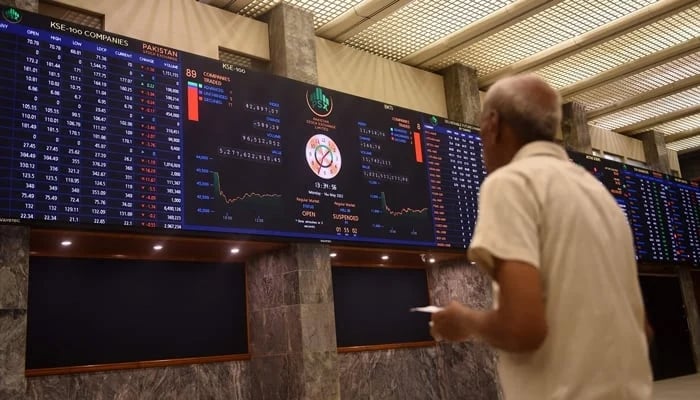Investors bet big
LAHORE: Though the buoyancy in the stock market, (rising trend in stock prices), is often perceived as a positive indicator, it's important to note that the relationship between the stock market and the overall economy is not so simple.
While the stock market can be influenced by economic conditions, it's not a direct and perfect reflection of the overall health of the economy. Pakistan stock market has never gone up so persistently in the past. Not even customary correction has taken place in its journey from 5500 points to 6400 points.
We know that the stock market is forward-looking, and stock prices are influenced by expectations about future corporate earnings, economic conditions, and other factors. If investors believe the economy will improve, they may bid up stock prices even if current economic indicators are mixed.
But we must also realize that the stock market primarily reflects the performance of publicly traded companies. Some sectors or industries may perform well while others struggle, leading to variations in stock market performance. Therefore, the stock market might not capture the entire economic landscape. Moreover the listed companies in Pakistan are too low for the size of its economy.
Global economic conditions, geopolitical events, and other external factors can impact the stock market. For example, a global economic slowdown or political instability in major economies can influence stock prices, regardless of the domestic economic situation. Our market is moving up despite uncertainty in global markets.
One interesting point in this regard is that usually the central bank policies, especially interest rate decisions, significantly impact the stock market. In this regard lower interest rates make stocks more attractive compared to other investments, potentially leading to higher stock prices.
But it is otherwise in Pakistan where the higher interest rates have not deterred investors from buying stocks. It is unlikely that investors would get returns of 22 percent or above on their stocks.
Stock prices are also influenced by individual company performance. A company-specific positive development, such as strong earnings or successful product launches, can cause its stock price to rise even if the broader economy faces challenges. Nothing unusual in this regard has happened in Pakistan where corporate results are as good as in past many years.
Investor sentiment and speculative behavior can also drive stock prices. Markets can sometimes be influenced by emotions, leading to periods of overvaluation or undervaluation that may not align with economic fundamentals. But the market has gone too high and speculators or manipulators lack the muscle to control its behavior.
The only plausible explanation is that investors believe that the quantum of foreign investment that the government claims is coming. The interest of foreign portfolio investors in the Pakistan Stock Exchange also strengthened their optimism. Otherwise the other indicators of the economy are not so healthy. The inflation has remained stubbornly high, because of high inflation the central bank is constrained to keep its policy rates at 22 percent despite its desire to lower it.
While a buoyant stock market can be a positive sign and may reflect optimism about economic prospects, it is not a foolproof indicator of the overall health of the economy. Economic health is better assessed by considering a broader set of indicators, including employment data, GDP growth, consumer spending, and more. All these indicators are abnormally low.
-
 Paul McCartney Talks 'very Emotional' Footage Of Late Wife Linda In New Doc
Paul McCartney Talks 'very Emotional' Footage Of Late Wife Linda In New Doc -
 Princess Beatrice, Princess Eugenie's Response To Andrew's Arrest Revealed
Princess Beatrice, Princess Eugenie's Response To Andrew's Arrest Revealed -
 King Charles And Princess Anne Bestow Honours At Windsor Castle
King Charles And Princess Anne Bestow Honours At Windsor Castle -
 King Charles 'worried' As Buckingham Palace, Royal Family Facing 'biggest Crisis'
King Charles 'worried' As Buckingham Palace, Royal Family Facing 'biggest Crisis' -
 Milo Ventimiglia Recalls First Meeting With Arielle Kebbel On The Sets Of 'Gilmore Girls' Amid New Project
Milo Ventimiglia Recalls First Meeting With Arielle Kebbel On The Sets Of 'Gilmore Girls' Amid New Project -
 Eric Dane Infuriated After ALS Diagnosis As He Feared The Disease Would Take Him Away From His Girls
Eric Dane Infuriated After ALS Diagnosis As He Feared The Disease Would Take Him Away From His Girls -
 It's A Boy! Luke Combs, Wife Nicole Welcome Third Child
It's A Boy! Luke Combs, Wife Nicole Welcome Third Child -
 Leading Astrophysicist Shot Dead At Southern California Home
Leading Astrophysicist Shot Dead At Southern California Home -
 Johnny Depp's Kind Gesture Towards Late 'Grey's Anatomy' Actor Eric Dane Before Death Laid Bare
Johnny Depp's Kind Gesture Towards Late 'Grey's Anatomy' Actor Eric Dane Before Death Laid Bare -
 How Princess Eugenie, Beatrice React To Andrew Arrest?
How Princess Eugenie, Beatrice React To Andrew Arrest? -
 Kylie Jenner 'convinced' Gwyneth Paltrow Is 'crushing' On Timothee Chalamet: 'It's Disrespectful'
Kylie Jenner 'convinced' Gwyneth Paltrow Is 'crushing' On Timothee Chalamet: 'It's Disrespectful' -
 Gemma Chan Reflects On 'difficult Subject Matter' Portrayed In 'Josephine'
Gemma Chan Reflects On 'difficult Subject Matter' Portrayed In 'Josephine' -
 Blood Falls In Antarctica? What Causes The Mysterious Red Waterfall Hidden In Ice
Blood Falls In Antarctica? What Causes The Mysterious Red Waterfall Hidden In Ice -
 AI Power Play: Nvidia Moves To Invest $30 Billion In OpenAI
AI Power Play: Nvidia Moves To Invest $30 Billion In OpenAI -
 Will Savannah Guthrie Ever Return To 'Today' Show? Here's What Insiders Predict
Will Savannah Guthrie Ever Return To 'Today' Show? Here's What Insiders Predict -
 Andrew Mountbatten-Windsor In A Fix Over New Disturbing TMZ Photos
Andrew Mountbatten-Windsor In A Fix Over New Disturbing TMZ Photos




